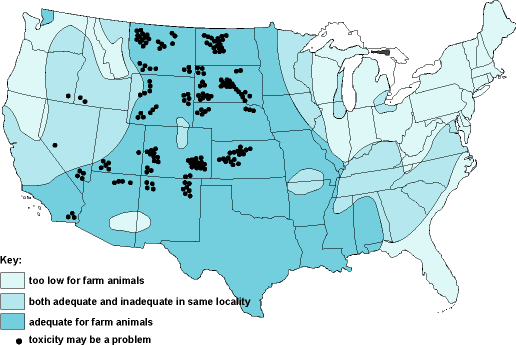|
|
MINERAL SUPPLEMENTS
Pastured goats should have access to a supplemental mineral mix designed for goats. If goats are not being fed in a way that insures that each goat gets the correct amount of mineral supplement, they should have free access to a mineral supplement that contains enough salt to prevent overeating of the supplement.
Minerals that are meant to be mixed with or added to a feed ration should not be fed free choice. Some goats may eat too much and end up with selenium toxicity. Symptoms occur suddenly when the selenium level gets too high and it is usually fatal.
Mineral mixes for sheep do not contain copper that goats require. Mixes designed for cattle can be fed to goats if a goat mix is unavailable. Goat mixes are more concentrated and more likely to be consumed in the amounts needed to maintain nutritional balance. Goats are not likely to get sufficient mineral from blocks or licks.
Much of North America, including western Oregon, does not have sufficient selenium in the soil for goats to naturally maintain a sufficient level to be healthy. Selenium toxicity from getting too much selenium can occur if they get too much, either by over-eating supplements or from the pasture itself in areas where the soil level is too high. Local extension agents or veterinarians can tell you about selenium levels in your area. Some parts of the country have variation in local soils that may be low, high, or even toxic.

After Council for Agricultural Science and Technology, Selenium: An essential poison, Sci. Food Agric., pp. 22–26, 1986
When purchasing mineral supplements for pastured goats, the best choice would be a granular mix that is intended to be fed free choice and contains selenium in an appropriate amount for your locale. Sweetlix Meat Maker in 25 lb. bags is a commonly available mix that is meant to be fed free choice. Beaver Brand Goat Mineral, made in McMinnville Oregon, comes in 50 lb. bags. It is carried by some of our local feed stores and works well for us.
This type of supplement should always be available to pastured goats in a covered feeder to keep it dry. They will usually eat it if it gets caked on top from moisture in the air, but goats will eat mineral supplements more regularly if they are fresh and dry. Goats will not eat enough mineral if it gets contaminated with urine or feces from goats or other animals. If this happens, or you think it may have, the mineral should be dumped and replaced with fresh. The amounts consumed can vary a great deal, depending on pasture conditions or other factors. Sometimes hardly any may be used for weeks, then the feeder may be emptied daily for a while. Smaller amounts can be put out during slow periods, and increased when consumption goes up. Water should be available nearby, especially in the dry season, but at least several feet away from the mineral feeder.
Where soils are low in selenium, goats may not eat enough mineral supplement, and become deficient or marginally low even if the mineral is consistently offered. If selenium deficiency is suspected or found by testing, a veterinarian may prescribe injectable Bo-Se, selenium with vitamin E. It is not labeled for goats, but is widely used.
|

